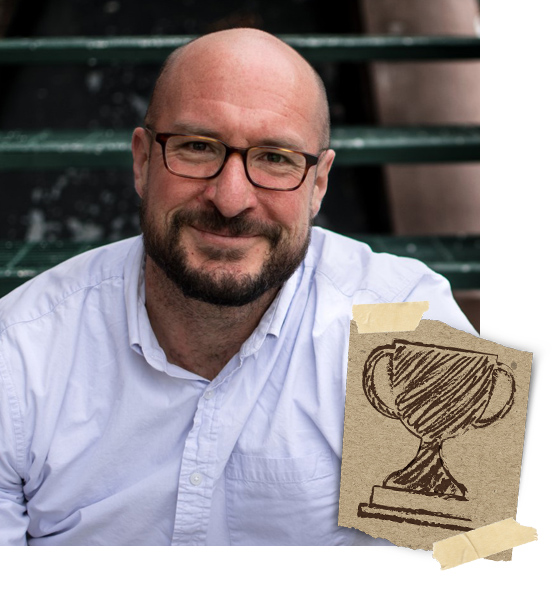Diversity Champion: Dr. Ignacio Acevedo-Polakovich
September 14, 2020
 Dr. Ignacio Acevedo-Polakovich is an associate professor of psychology at MSU. Specializing in community psychology, Dr. Acevedo-Polakovich is the founder and director of the Community-Academic Innovation and Dissemination (Community-AID) lab, which studies ways to support the success and well-being of families and youth of all backgrounds.
Dr. Ignacio Acevedo-Polakovich is an associate professor of psychology at MSU. Specializing in community psychology, Dr. Acevedo-Polakovich is the founder and director of the Community-Academic Innovation and Dissemination (Community-AID) lab, which studies ways to support the success and well-being of families and youth of all backgrounds.
Tell us about your time at Michigan State University so far.
I've been at MSU since 2015, when I joined the Department of Psychology as an associate professor. I feel really fortunate to be part of the community psychology doctoral program, as it is the oldest and probably most influential of its kind in the U.S. and therefore the world.
The program brings together community-engaged researchers who are focused on finding practical solutions to foster equity and address injustice in a variety of spaces. A lot of my work focuses on health equity and educational justice, but I have peers who focus on issues such as domestic violence, HIV/AIDs, autism, and et cetera in a way that's meant to generate solutions now - not twenty years down the pipeline.
When was the Community-AID lab started, and what are the lab's research focuses?
I started it when I was at a prior institution, for two primary reasons. First, the type of work that I do requires a team of researchers, graduate students and practitioners. Second, the projects I work on are always focused on equity, especially in spaces that work with children, youth and families, and so the fact that there was a really strong common theme to these projects allowed the lab to start.
When I came to MSU, I brought over the same approach, and have mostly focused on health service equity and educational justice issues. The work of the lab is guided by our vision statement, which is "to ensure that all children, youth and families have equal access and equal opportunity for well-being." It's not the case in the United States. If you're poor, if you live in a rural community, if you belong to certain ethnic or racial groups, if you have certain gender identities or sexual orientations, you don't have equal access to those opportunities to well-being. So, we work very attentively and focus to make sure that that is no longer the case in as many spaces as possible.
What makes this work meaningful for you?
The founding ideals of this country are based on equity. The founding documents include the aspirational call that liberty and justice are for all, but historically, we've failed different groups in ensuring that. However, historically, we've also made attempts to remedy those failures. For me, that notion of equity and justice that's embedded in the way we defined our nation is really important. Once everyone has equal access to the pursuit of these things, then we've fully realized the vision of our nation.
For most of us, there's still a lot we need to learn about Hispanic and Latinx heritage. What are some things about your heritage you wish more people would understand?
Latinx people in the U.S. have had a tremendously long history here, through both our indigenous and colonial roots. So many of our states are named in Spanish - Florida, Colorado, California, Arizona - because of their colonial history, which began with Spanish colonies.
It is important for folks to understand that Latinx folks have been here in some way, shape, or form for the entire history of the United States and have had an important role in it. We have a history that is deeply tied to the emergence of this nation and the issues that this nation has faced. A lot of times, there is a narrative that Latinx people's history starts with very recent immigration patterns, but that just isn't true, and it washes away our complex history in this country.
How can we create a more inclusive space for Hispanic and Latinx people in higher education?
The key issue is representation. The institutions of higher education in the United States have a history that's tied to colonization and displacement. As a result, we don't learn about different histories, because the education provided by these institutions of higher education comes from a very Eurocentric tradition. I think representation means representation in the curriculums, in the faculty, in the practices and values. The lack of representation that I argue needs to be addressed isn't limited to Latinx people - it includes all of the humans who have not been represented in higher education because of those same origins.
MSU, because of its land-grant history, has a particular obligation to Latinx communities in Michigan for representation. We as an institution are supposed to be available, accessible and representative of the public and responsive to public needs. That sets us apart from other institutions of higher education in Michigan and in the Midwest. Our commitment to representing and addressing the needs of Michiganders in general makes it particularly crucial that we also respond to the needs of Michiganders who are Latinx, African American or Native American, because we are a land-grant university.

